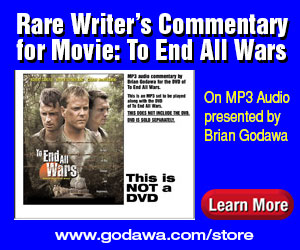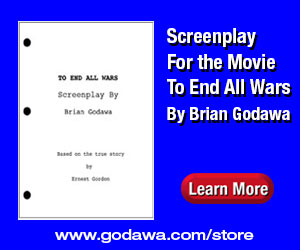Maybe Fury is just another guys’ violent war movie about how war is hell.
But I doubt it
Fury is a war movie about a tank squad rumbling through the German countryside, killing SS and German soldiers near the end of World War II.
But it is so much more.
Battle movies can actually be quite boring if they reduce to guys spouting jokes and ironic lines as they move from battle scene to battle scene. But Fury does not degrade into that. Brad Pitt as the leader of the squad, “Wardaddy,” does a great job with a lead character that is otherwise a bit thin on development. The “new guy” protagonist, Norman, is an archetype of the innocent inexperienced soldier who comes of age in a brutal world. He struggles with his first kill, helped by Wardaddy, and has to grow up fast by accepting the tragic reality that whatever he does or doesn’t do directly affects the survival of his comrades in arms. So, when Norman is forced to kill his first SS captive, he balks and says it isn’t right. Wardaddy explains that it isn’t about right and wrong, it’s about survival against soldiers who will kill you if you do not kill them first. This is not a brutish denial of morality, but rather a simplified way of explaining the hard reality that when evil people seek to kill you, if good men do not kill them first, then evil will prevail. Sound at all familiar with the terror of today? At another moment, Wardaddy says to Norman the theme of the film, “Ideals are peaceful, history is violent.” It seems that to Wardaddy, it is the soldier’s sacrifice that builds the freedom upon which normal citizens can have the luxury to moralize.
In another memorable scene, Wardaddy and Norman find an apartment with a lady and her young daughter (or niece. I can’t remember). Wardaddy cleans up and has the women make them a home cooked meal in a tension filled metaphoric attempt to experience that semblance of civil society that they had to give up to fight the war. Wardaddy also keeps his more animalistic members of the squad from raping the women. It showed the human decent side of a harsh leader that seeks to keep the goodness of what they fought for in his memory.
One word: Profound.
 But what moved me most about the film was Shia LeBeouf’s stellar performance as Boyd Swan, a Bible believing Christian. It’s been a while since I’ve seen a real manly Christianity in a Hollywood movie like this. Normally, they are Roman Catholic or other mainline denomination, which are more safe characters to play. But such Protestants or Evangelical Christians are usually portrayed as nutballs, murderers and hypocritical leches. Three cheers to Director David Ayer for finally portraying an Evangelical Christian with positive rigorous and manly vigor!
But what moved me most about the film was Shia LeBeouf’s stellar performance as Boyd Swan, a Bible believing Christian. It’s been a while since I’ve seen a real manly Christianity in a Hollywood movie like this. Normally, they are Roman Catholic or other mainline denomination, which are more safe characters to play. But such Protestants or Evangelical Christians are usually portrayed as nutballs, murderers and hypocritical leches. Three cheers to Director David Ayer for finally portraying an Evangelical Christian with positive rigorous and manly vigor!
Shia’s wordless looks alone stole the movie and said more than all the words being tossed around between the men. Not once was Boyd mocked by the storyteller. Oh, sure, his buddies in the story mocked him playfully, but in the end, they all respected him and his convictions. There is even a theological discussion about God’s love in relation to evil men like Hitler, and I could not believe that the issue was wrestled with honestly and with integrity unlike what I have seen before in a war movie (Other than To End All Wars). It showed that clearly the writer director was a Christian because it showed a nuance and depth unseen in other movies by non-Christian storytellers who observe faith from a distance without understanding.
There is a moment the night before the men face their ultimate battle. It is the “dark night of the soul” moment in the story. Boyd mentions a Bible verse that led him into the war, “And I heard the voice of the Lord saying, “Whom shall I send, and who will go for us?” And then Wardaddy finishes the verse, saying, “Then I said, “Here I am! Send me. Isaiah 6:8.” And we see that Wardaddy is not as cold and cruel and cynical as he appears on the surface. There is more to what we see here than a brute fighting machine.
The men all share a “Last Supper” of sorts with a drink of bourbon and a smoke. It is a holy moment as they face their sacrificial impossible last fight. The men are not unscathed by the horrors of war. They have all been damaged, and the faith of Boyd deals squarely and honestly with that reality. It doesn’t devolve into a blinded ideological denial.
 But the point is that rather than making faith at odds with the war, as an unlivable contradiction, or even as something to be mocked as an oddity of personality in one of the characters, the Christian faith of Boyd actually becomes the thing that gives true spiritual depth to the meaning and sacrifice of the story. Without Christianity, war is senseless survival of the fittest with death upon death. But only with Christianity can the purpose of fighting transcend mere will to power and give meaning to the notion of good fighting for justice in an evil world. It isn’t easy and it doesn’t give all the answers, but it is a muscular faith that faces the gritty real world.
But the point is that rather than making faith at odds with the war, as an unlivable contradiction, or even as something to be mocked as an oddity of personality in one of the characters, the Christian faith of Boyd actually becomes the thing that gives true spiritual depth to the meaning and sacrifice of the story. Without Christianity, war is senseless survival of the fittest with death upon death. But only with Christianity can the purpose of fighting transcend mere will to power and give meaning to the notion of good fighting for justice in an evil world. It isn’t easy and it doesn’t give all the answers, but it is a muscular faith that faces the gritty real world.
The writer director David Ayer is my new storytelling hero.

